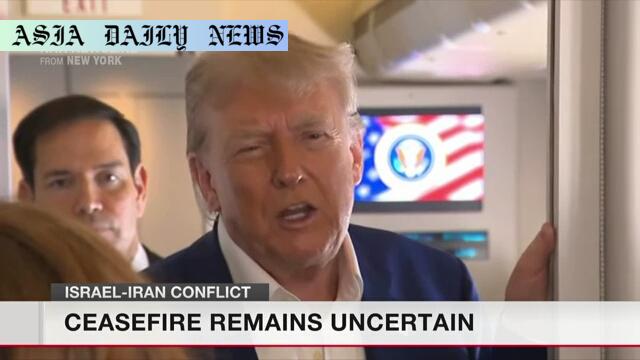Ceasefire – US President Donald Trump accuses Israel and Iran of ceasefire violations amid intensified conflict and casualties.

The Fragile Ceasefire Amid Heightened Tensions
The volatile truce between Israel and Iran has escalated into one of the deadliest confrontations in recent memory. Initially brokered by U.S. President Donald Trump, the ceasefire was intended to bring temporary relief to a region fraught with political strife and violence. However, accusations of violations by both governments have plunged the agreement into chaos, leading to devastating consequences. Israeli forces launched an attack on Iranian installations reportedly in response to missile strikes, prompting an angry backlash from Trump. The president expressed his profound disappointment with both nations but emphasized his desire to avoid further destabilization, particularly in Iran, where a regime change could spark chaos.
The Humanitarian Cost of the Conflict
The ongoing fighting between the two Middle Eastern powers has left a significant trail of destruction and human suffering. Iranian Health Ministry reports cite a death toll of 610, with more than 4,700 individuals wounded. Meanwhile, figures from Israeli media indicate 28 fatalities and over 3,000 injuries among their population. The toll is shocking, but the most heart-wrenching tragedy has unfolded in Gaza, where health authorities report over 56,000 casualties since the renewed hostilities began. The numbers underscore the profound costs borne by innocent civilians amid unrelenting military escalation.
Political Rhetoric and Shared Claims of Victory
Despite the grim reality, both Israeli and Iranian officials have declared what they term “historic victories.” Israeli Prime Minister Benjamin Netanyahu cited a generational achievement, calling Trump a great ally to Israel. Similarly, Iranian President Masoud Pezeshkian proclaimed significant national gains while reiterating his government’s commitment to peace and stability. Observing these statements raises questions about the disconnect between political narratives and ground realities, especially when thousands of lives have been lost. The rhetoric from leadership serves to amplify nationalistic fervor, yet the actual state of affairs remains tenuous.
Shifting Priorities and Emerging Challenges
Despite ongoing tensions with Iran, Israeli defense forces have shifted their focus back to Gaza, vowing to dismantle Hamas. This decision aligns with long-term national objectives but comes at a time when regional stability hangs in the balance. Between Iran’s strained health infrastructure and Israel’s complex political landscape, both nations are grappling with formidable internal and external challenges. The role of larger players like the United States adds another layer of complexity, as Trump’s firm stance offers support while also highlighting the fragility of alliances in the region.
Path Ahead: Can Peace Be Salvaged?
As the conflict rages on, the central question remains whether peace can realistically be achieved. It would require genuine diplomatic efforts, mutual trust-building, and a resolve to prioritize human lives over political gains. The escalating death toll and trauma inflicted on civilian populations highlight the urgent need for a new approach. Whether international pressures or internal shifts in public opinion can drive meaningful change in the region remains to be seen. For now, the shadow of war looms heavily over the Middle East.
Commentary
Analyzing the Fragility of Ceasefire Agreements
Ceasefires are often delicate and easy to unravel, particularly in complex geopolitical landscapes such as the Middle East. The recent Israel-Iran truce brokered by the United States underscores the inherent challenges of achieving lasting peace under such circumstances. Both sides possess deeply rooted grievances and historical animosities, and these factors inevitably complicate the negotiation and maintenance of a ceasefire. It’s disheartening to observe how quickly violence escalated following what many hoped would be a step towards de-escalation. This scenario highlights the need for stronger frameworks that consider not only political agreements but also trust-building measures and ground-level enforcement strategies.
The Human Cost: An Urgent Wake-Up Call
While political leaders on both sides are quick to claim victories, the staggering loss of human lives during this episode poses an ethical dilemma. For countries like Israel and Iran, national security and military objectives often take precedence over the humanitarian cost. However, in Gaza, where the death toll has surpassed 56,000, the issue brings to light the disproportionate suffering inflicted on vulnerable populations. This conflict should serve as a wake-up call to the international community to step in and mediate more effectively. Civilian causalities on this scale demand accountability and humanitarian intervention on an urgent basis.
Rhetoric vs Reality: Are ‘Victories’ Justified?
The declarations of ‘historic victories’ by leaders like Netanyahu and Pezeshkian are telling of the political narratives driven in times of such crises. However, these statements seem disconnected from the harsh realities on the ground. For the average citizen affected by the conflict—the families mourning lost loved ones or refugees facing displacement—there is little solace in these assertions. Political rhetoric often fuels nationalistic sentiment but does little to foster genuine reconciliation.
The Role of Global Powers
U.S. involvement, particularly Trump’s controversial remarks, adds yet another layer to this intricate web of conflict. While American diplomacy has occasionally borne temporary solutions, the current administration’s approach appears to have exacerbated tensions. President Trump’s evident frustration with both parties, coupled with his emphasis on avoiding regime change in Iran, indicates a lack of cohesive strategy. The role of global superpowers must be reexamined if long-term stability is to be achieved.


